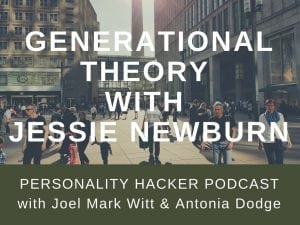Download Episode Here – right click link and select “Save Link As…”
In this episode, Joel and Antonia talk with Jessie Newburn about generational theory and how to apply the understanding of Boomer, Generation X, and Millennials to your life.
In this podcast you’ll find:
Jessie Newburn
Generational Theory – The predictable cyclical pattern around how groups of people evolve in time and impact and influence each other.
Generations are a huge node in the system.
Millennials Rising by Howe and Strauss
Four generational archetypes, lasting about 20 years and repeating in a predictable method.
Generations form history and history forms generations.
We are midway thru one of the 20-year cycles.
The Greatest Generation (GIs) are the same archetype as today’s Millennials.
The Four generational archetypes are characterized as four seasons or turnings:
- Spring – First turning. After winter. Renewal. Possibility. Fecundity. Spring is when the Boomers were born after the wake of WWII.
- Summer – Second turning. Generations X was born during summer. Cultural revolution. Everyone out of the dark. Time to relax while things grow. Look at music in 1963 and again in 1965 and you will see a clear distinction.
- Autumn – Third Turning. Millennials born in autumn. Harvest time. Wall Street. Materialism. Entitled. Expectation. A time of abundance and plenty.
- Winter – fourth turning – Homelanders. Winter represents the time when that which isn’t strong dies. You can’t go outside and play until 9 pm in winter. Scarcity. Fear of loss. Crisis. Underlying feeling around the world is of crisis which begets a different type of thinking. In every fourth turning, there has always been a total war.
We are in winter. It extends from 2004-2024 roughly.
As children we receive info. Not much ability to discern, just absorb.
Generations are formed by where they are per their life phase:
- Boomers born in spring. Everything is wonderful. Their young adulthood was characterized by peace, love, and rock-n-roll during summer. Prime money earning years were in fall. Elderhood is in winter, a time of crisis.
- Gen. Xers are born in summer during a time when everyone is free to do whatever. Who needs seat belts and bicycle helmets? Their young adulthood is in fall which is the wild west of economics. Prime earning years is in winter. Elder years are in Spring.
- Millennials are born in fall. Plenty. Abundance. Young adulthood is in winter. Not enough money. No jobs. What they don’t understand is this is cyclical for them. They get to be the heroes of this era. Their midlife will be in spring. When things are fresh and new again and society is coming out of its darkness. Elder years in summer when the cultural revolution decides everything they have built is garbage.
Millennials will give birth to the next generation of Boomers who will call everything created by “The Man” or their parents crap, and demand a cultural revolution.
Millennials were the beloved special children. Everything was done for them in the young adult years (“Make college more affordable,” “Make the workplace safe.”).
In midlife, they suck money out of the system in the form of government that they direct to their generation.
Homeland generation (aka Silent Generation) are born in winter when adults are very scared about the outer world.
The Primary generation raising Homelanders are Gen Xers, who grew up in an unprotected world, so they flip the energy as generations do and end up overprotecting and suffocating their children.
Homelanders have their young adulthood in spring when there is massive opportunity.
Homelanders hit every phase of life right for economic prosperity and every phase of life wrong for experiential bonuses. They miss out on a lot but tend to be a very wealthy generation that is well liked and respected.
If you live an average 80-year life span, you will experience every generation. But every generation will be slightly different than every other.
Race is a non-issue to Millennials. Same with alternate sexuality.
Silent Generation still wants to have a conversation around race. They are 70s-80s.
Boomers still want it to be at the forefront of the conversation with pickets and signs.
Gen Xers carried immigration on their shoulders. They’ve been called the smallest generation which is inaccurate. They are the largest generation because of massive immigration.
Millennials enjoyed a time of abundance, so they think there is always enough resources for everybody.
It’s only when there is a scarcity of resources that scarcity mentality rules everything.
Millennials aren’t prepared for the winter. They have a mindset of abundance and then encounter scarcity.
An understanding of generations helps us understand our parents and our children better.
We are halfway through Winter. There’s no speeding it up. Things aren’t going to get better for another decade. We will likely see a total war. So, how are you choosing to live your life? Do you want to keep expenses minimal? Do you want to buy property? Do you want to maintain some flexibility in life? Do you want to have children?
Everyone’s decisions will be more informed if they take generational theory into consideration.
Each generation wants to be different. Generations are not linear. They make sharp turns from generation to generation.
Millennials rebel against the Gen X definition of youth.
Gen X rebelled against the Boomers definition of youth.
Gen Xers were very scattered. So Millennials see that and decide they don’t want to be scattered they want to work together for change.
Part of what makes America great is because it is one of the most predominant cultures that experiences Generational Theory. Cultures that allow their children expression and choice experience Generational Theory because they experience this ability to hit reset and change ideals from one generation to the next.
Gen X creed is: “I just want the world to suck less after I’m gone.”
Boomer creed is: “Values! We have to stand for something!”
Every generation looks down on every other generation
Millennial optimism is tremendous. A nice contrast to the cynical Generation X.
Millennials bring a sense of togetherness. Part of what makes them the hero generation is their persistent optimism in the midst of winter. Even in the darkness, there is light.
They’ve transformed the heavy work focus of the previous generations.
Every generation has different technology:
- Silent Generation – credentialed expert. Believed in PHDs, job titles, authority. If info doesn’t come from a credentialed expert, it’s not valid.
- Boomers – Prophet Generation. Focused on the guru that can speak to something from the most fundamental value driven perspective. Who has the most book sales and biggest audience? Kings and Queens of broadcast.
- Gen Xers – Panache and brand. Create status. Affiliate links. Monetize. They break the stronghold of the credentialed experts. Scatter. Move away from the center.
- Millennials – Crowdsourcing. Sharing info. Move toward the center.
Prediction is that when millennials hit midlife, we will see a quelling of minority voices and dissent.
Nobody cared about Gen Xers. The focus is always on Millennials.
Generations are either recessive or dominant. Boomers and Millennials are dominant, and Gen Xers and Homelanders are recessive.
Gen Xers tend to independence and lean Republican
Millennials tend to be more involved in govt and lean Democrat. Millennials believe in govt because govt took care of them.
Gen Xers world view is that the govt doesn’t care. There is no net. The system doesn’t have my back. Gen Xers are the gamblers, the risk takers, and they put their time and energy into where things will work. If politics doesn’t work, it’s not worth the effort.
Talk with Millennials in positive future paced language that supports their success and growth.
Talk with Gen Xers with radical honesty. Function and getting things done.
Boomers want to mentor Millennials. Tired of cynical Gen Xers.
Generational theory can help frame self in time and understand the world. We have a tendency to be less panicked about world issues if we realize its cyclical nature.
To subscribe to the podcast, please use the links below:
Subscribe with iTunes
Non iTunes Link
Download The Android App
Subscribe on Soundcloud
Subscribe with Stitcher
If you like the podcast and want to help us out in return, please leave an honest rating and review on iTunes by clicking here. It will help the show and its ranking in iTunes immensely! We would be eternally grateful!
Want to learn more?
Discover Your Personal Genius
We want to hear from you. Leave your comments below…



Share:
Podcast - Episode 0130 - Black Sheep, Odd Ducks, and Outliers
Podcast - Episode 0132 - Your Inferior Cognitive Function
46 comments
This woman is partly right in her estimation that people will solidify more and more, and less minority opinions will be available. But I think it has more to do with the competition of ideas and consensus due to demographic shift and/or drift.
Gen X was a shift, and Gen Y is a drift from the dominant political concensus. The economic shift engeandered by Gen X thru immigration and so on has rigged the system to gobble up the G.I and their children.
What was that refrain I heard often as a child from Gen X folk? Eat your parents. And now in order to survive I find myself doing just that, and I don’t feel right about it.
I’ve been most impacted by the children of the Silent Generation, economically, and their children Gen X respectfully, and most impacted by the children of the GI gen politically, and their Boomer children respectfully.
Gen Xers are typified what I would call a “player” in a “game”. We’re seeing the politic Boomer generation either adapting to this Gen X concept and succeeding, or we see them falling out of favor. What we did see was the response from younger people towards Bernie Sander’s platform, and most of them happen to be Gen Y who have a lot in common with G.I and the Silent Gen.
When you talk about recessive and dominant generations with this foil in mind it shades things for me as a Gen Y (1986), someone who was heavily influenced by Generation X and my older Boomer parents 1952/49.
Friends and family are very important to me. More than anything. I’m strictly values based, and am amazed how much it shoots me in the foot in society run economically by Gen X.
Long time listener, first time poster- fascinating podcast on generation theory. My thoughts on the war we’re going to “fight” this winter cycle: climate change/ peak oil. Seems to me the attacks on 9/11 were the kick off for the US.
Here’s a link to Bill McKibben’s interesting article on how we should be moblizling for climate change the way we moblized for WWII.
https://newrepublic.com/article/135684/declare-war-climate-change-mobilize-wwii
I should also add that my dad is a baby boomer born in 1957. He is the youngest of a big family and my grandma was 45 when he was born. His parents were from an earlier generation than that of his peers and I’m sure that influenced his upbringing and, subsequently, his parenting.
This was fascinating and thought provoking -thank you.
One thing I would love to hear you guys explore in depth is how being born in the transitional period between two generations can affect people. I was born in 1981 and I’m 35. Since there’s no “official” definitive line on when Gen X ended and the Millenial generation began, I’ve been lumped into both, depending on the source.
I don’t identify with either generation. I identify with certain aspects of each, but don’t feel that I belong to either. In researching this, I discovered that this is a common phenomenon with many people born between approximately 1978-1982. I’ve heard it described as a micro generation.
I’ve read a few great articles on it and it even has a Wikipedia page.
https://en.m.wikipedia.org/wiki/Oregon_Trail_Generation
http://m.huffpost.com/us/entry/7438370
http://www.slate.com/articles/life/culturebox/2011/10/generation_catalano_the_generation_stuck_between_gen_x_and_the_m.single.html